- Home
- James Clavell
Whirlwind Page 50
Whirlwind Read online
Page 50
Paknouri’s mouth struggled. “I… I…you cannot…there…” His voice trailed away. A little foam seeped from the comers of his lips. They all watched him, the Green Bands without emotion, the others with horror.
Ali Kia cleared his throat. “Now, listen, perhaps it would be better to leave this until tomorrow,” he began, trying to keep his voice important. “Emir Paknouri’s clearly upset by the mista—”
“Who’re you?” The leader’s eyes bored into him as they had into Paknouri and Bakravan. “Eh?”
“I’m Deputy Minister Ali Kia,” Ali replied, keeping his courage under the strength of the eyes, “of the Department of Finance, member of Prime Minister Bazargan’s cabinet and I suggest you wait u—”
“In the Name of God: you, your Department of Finance, your Cabinet, your Bazargan has nothing to do with me or us. We obey the mullah Uwari, who obeys the Komiteh, who obeys the Imam, who obeys God.” The man scratched absently and turned his attention back to Paknouri. “In the street!” he ordered, his voice still gentle. “Or we’ll drag you.”
Paknouri collapsed with a groan and lay inert. The others watched helplessly, someone muttered, “The Will of God,” and the little teaboy began sobbing.
“Be quiet, boy,” Yusuf said without anger. “Is he dead?”
One of the men went over and squatted over Paknouri, “No. As God wants.”
“As God wants. Hassan, pick him up, put his head in the water trough, and if he doesn’t wake up, we’ll carry him.”
“No,” Bakravan interrupted bravely, “no, he’ll stay here, he’s sick an—”
“Are you deaf, old man?” An edge had crept into Yusuf’s voice. Fear stalked the room. The little boy crammed his fist into his mouth to prevent himself from crying out. Yusuf kept his eyes on Bakravan as the man called Hassan, broad-shouldered and strong, lifted Paknouri easily and went out of the shop and up the alley. “As God wants,” he said, eyes on Bakravan. “Eh?”
“Where…please, where will you be taking him?”
“To jail, of course. Where else should he go?”
“Which…which jail, please?”
One of the other men laughed. “What does it matter what jail?”
For Jared Bakravan and the others, the room was now stifling and cell-like even though the air had not changed and the open front onto the alley was as it had ever been.
“I would like to know, Excellency,” Bakravan said, his voice thick, trying to mask his hatred. “Please.”
“Evin.”
This had been the most infamous of Tehran’s prisons. Yusuf sensed another wave of fear. They must all be guilty to be so afraid, he thought. He glanced behind him at his younger brother. “Give me the paper.”
His brother was barely fifteen, grubby and coughing badly. He took out half a dozen pieces of paper and shuffled through them. He found the one he sought. “Here it is, Yusuf.”
The leader peered at it. “Are you sure it’s the right one?”
“Yes.” The youth pointed a stubby finger at the name. Slowly he spelled out the characters. “J-a-r-e-d B-a-k-r-a-v-a-n.”
Someone muttered, “God protect us!” and in the vast silence Yusuf took the paper and held it out to Bakravan. The others watched, frozen.
Hardly breathing, the old man took it, his fingers trembling. For a moment he could not focus his eyes. Then he saw the words; “Jared Bakravan of the Tehran bazaar, by order of the Revolutionary Komiteh and Ali’allah Uwari, you are summoned to the Revolutionary Tribunal at Evin Jail tomorrow immediately after first prayer to answer questions.” The paper was signed, Ali’allah, the writing illiterate.
“What questions?” he asked dully.
“As God wills.” The leader shouldered his carbine and got up. “Until dawn. Bring the paper with you and don’t be late.” At that moment he noticed the silver tray and cut glasses and half-empty bottle of vodka that was on a low table almost hidden by a curtain in the dark hallway, glinting in some candlelight. “By God and the Prophet,” he said angrily, “have you forgotten the laws of God?”
The shop people scattered out of his way as he upended the bottle, emptying the contents on the dirt floor, and hurled the bottle away. Some of the liquid ran onto one of the carpets. Instinctively the teaboy fell on his knees and began to mop it up.
“Leave it alone!”
Petrified, the boy scuttled away. With his foot, Yusuf carelessly diverted most of the flow. “Let the stain remind you of the laws of God, old man,” he said. “If it stains.” For a moment he studied the carpet. “What colors! Beautiful! Beautiful!” He sighed and scratched, then turned on Bakravan and Kia. “If you were to take all the wealth of all of us pasadan here, and add it to that of all our families, and our fathers’ families, still we could not afford even a corner of such a carpet.” Yusuf smiled crookedly. “But then, if I was as rich as you, Moneylender Bakravan—do you know usury is also against the laws of God?—even if I was so rich, still I wouldn’t buy such a carpet. I have no need of such treasure. I have nothing, we have nothing, we need nothing. Only God.”
He stalked out.
NEAR THE U.S. EMBASSY: 8:15 P.M. Erikki had been waiting for almost four hours. From where he sat in the first-floor window of his friend Christian Tollonen’s apartment, he could see the high walls surrounding the floodlit U.S. compound down the road, uniformed marines near the huge iron gates stamping their feet against the cold, and the big embassy building beyond. Traffic was still heavy, snarled here and there, everyone honking and trying to get ahead, pedestrians as impatient and self-centered as usual. No traffic lights working. No police. Not that they’d make any difference, he thought, Tehranis don’t give a damn for traffic regulations, never have, never will. Like those madmen on the road down through the mountains who killed themselves. Like Tabrizis. Or Qazvinis.
His great fist bunched at the thought of Qazvin. At the Finnish embassy this morning there had been reports of Qazvin in a state of revolt, that Azerbaijan nationalists in Tabriz had rebelled again and fighting was going on against forces loyal to the Khomeini government and that the whole oil-rich and vastly strategic border province had again declared its independence of Tehran, independence it had fought for over the centuries, always aided and abetted by Russia, Iran’s permanent enemy and gobbler of her territory. Rakoczy and others like him must be swarming all over Azerbaijan.
“Of course the Soviets are after us,” Abdollah Gorgon Khan had said angrily, during the quarrel, just before he and Azadeh had left for Tehran. “Of course your Rakoczy and his men are here in strength. We walk the thinnest tightrope in the whole world because we’re their key to the Gulf and the key to Hormuz, the jugular of the West. If it hadn’t been for us Gorgons, our tribal connections, and some of our Kurdish allies, we’d be a Soviet province now—joined to the other half of Azerbaijan that the Soviets stole from us years ago, helped as always by the insidious British—oh, how I hate the British, even more than Americans who are just stupid and ill-mannered barbarians. It’s the truth, isn’t it?”
“They’re not like that, not the ones I’ve met. And S-G’s treated me fairly.”
“So far. But they’ll betray you—the British betray everyone who’s not British and even then they’ll betray them if it suits them.”
“Insha’Allah.”
Abdollah Gorgon Khan had laughed without humor. “Insha’Allah! And Insha’Allah that in ’46 the Soviet army retreated over the border and then we smashed their quislings, and stamped out their ‘Democratic Azerbaijan Republic’ and the ‘Kurdish People’s Republic.’ But I admire the Soviets, they play only to win and change the rules to suit themselves. The real winner of your world war was Stalin. He was the colossus. Didn’t he dominate everything at Potsdam, Yalta, and Tehran—didn’t he outmaneuver Churchill and Roosevelt? Didn’t Roosevelt even stay with him in Tehran in the Soviet embassy? How we Iranians laughed! The Great President gave Stalin the future when he had the power to stuff him behind his own borders. What a genius! Beside him you
r ally Hitler was a craven bungler! As God wills, eh?”
“Finland sided with Hitler only to fight Stalin and get back our lands.”
“But you lost, you chose the wrong side and lost. Even a fool could see Hitler would lose—how could Reza Shah have been so foolish? Ah, Captain, I never understood why Stalin let you Finns live. If I’d been him I would have laid waste Finland as a lesson—as he decimated a dozen other lands. Why did he let you all live? Because you stood up to him in your Winter War?”
“I don’t know. Perhaps. I agree the Soviets will never give up.”
“Never, Captain. But neither will we. We Azerbaijanis will always outmaneuver them and keep them at bay. As in ’46.”
But then the West was strong, there was the Truman Doctrine toward the Soviets of hands off or else, Erikki thought grimly. And now? Now Carter’s at the helm? What helm?
Heavily, he leaned forward and refilled his glass, impatient to get back to Azadeh. It was cold in the apartment and he still wore his overcoat—the central heating was off and the windows drafty. But the room was large and pleasant and masculine with old easy chairs, the walls decorated with small but good Persian carpets and bronze. Books, magazines, and journals were scattered everywhere, on tables and chairs and bookshelves—Finnish, Russian, Iranian—a pair of girl’s shoes carelessly on one of the shelves. He sipped the vodka, loving the warmth it gave him, then looked out the window once more at the embassy. For a moment he wondered if it would be worth emigrating to the U.S. with Azadeh. “The bastions are falling,” he muttered out loud. “Iran no longer safe, Europe so vulnerable, Finland on the sword’s edge…”
His attention focused below. Now the traffic was totally blocked by swarms of youths collecting on both roads—the U.S. embassy complex was on the corner of Tahkt-e-Jamshid and the main road called Roosevelt. Used to be called Roosevelt, he reminded himself idly. What’s the road called now? Khomeini Street? Street of the Revolution?
The front door of the apartment opened. “Hey, Erikki,” the young Finn said with a grin. Christian Tollonen wore a Russian-style fur hat and fur-lined trench coat that he had bought in Leningrad on a drunken weekend with other university friends. “What’s new?”
“Four hours I’ve been waiting.”
“Three hours and twenty-two minutes and half a bottle of my best contraband Russian Moskava money can buy anywhere, and we agreed three or four hours.” Christian Tollonen was in his early thirties, a bachelor, fair and gray-eyed, deputy cultural attaché at the Finnish embassy. They had been friends since he came to Iran, some years ago. “Pour me one, by God, I need it—there’s another demonstration simmering, and I had a hell of a time getting through.” He kept his trench coat on and went to the window.
The two sections of crowds had joined now, the people milling about in front of the embassy complex. All gates had been closed. Uneasily Erikki noticed that there were no mullahs among the youths. They could hear shouting.
“Death to America, death to Carter,” Christian interpreted—he could speak fluent Farsi because his father too had been a diplomat here and he had spent five years of his youth at school in Tehran. “Just the usual shit, down with Carter and American imperialism.”
“No Allah-u-Akbar,” Erikki said. For a moment his mind took him back to the roadblock, and ice swept into his stomach. “No mullahs.”
“No. I didn’t see one anywhere around.” In the street the tempo picked up with different factions swirling around the iron gates. “Most of them are university students. They thought I was Russian and they told me there’d been a pitched battle at the university, leftists versus the Green Bands—with perhaps twenty or thirty killed or wounded and it was still going on.” While they watched, fifty or sixty youths began rattling the gates. “They’re spoiling for a fight.”
“And no police to stop them.” Erikki handed him the glass.
“What would we do without vodka?”
Erikki laughed. “Drink brandy. Do you have everything?”
“No—but a start.” Christian sat in one of the armchairs near the low table opposite Erikki and opened his briefcase. “Here’s a copy of your marriage and birth certificates—thank God we had copies. New passports for both of you—I managed to get someone in Bazargan’s office to stamp yours with a temporary residence permit good for three months.”
“You’re a magician!”
“They promised they’d issue you a new Iranian pilot’s license but when they wouldn’t say. With your S-G ID and the photocopy of your British license they said you were legal enough. Now, Azadeh’s passport’s temporary.” He opened it and showed him the photograph. “It’s not standard—I took a Polaroid of the photo you gave me—but it’ll pass until we can get a proper one. Get her to sign it as soon as you see her. Has she been out of the country since you were married?”
“No, why?”
“If she travels out on a Finnish passport—well, I don’t know how it will affect her Iranian status. The authorities have always been touchy, particularly about their own nationals. Khomeini seems even more xenophobic so his regime’s bound to be tougher. It might look to them as though she’d renounced her nationality. I don’t think they’ll let her back.”
A muted burst of shouting from the massed youths in the street diverted them for a moment. Hundreds were waving clenched fists and somewhere someone had a loudspeaker and was haranguing them. “The way I feel right now, as long as I can get her out, I don’t care,” Erikki said.
The younger man glanced at him. After a moment he said, “Perhaps she should be aware of the danger, Erikki. There’s no way I can get her replacement papers or any Iranian passport, but it’d be very risky for her to leave without them. Why don’t you ask her father to arrange them for her? He could get them for her easily. He owns most of Tabriz, eh?”
Bleakly Erikki nodded. “Yes, but we had another row just before we left. He still disapproves of our marriage.”
After a pause Christian said, “Perhaps it’s because you don’t have a child yet, you know how Iranians are.”
“Plenty of time for children,” Erikki said, sick at heart. We’ll have children in good time, he thought. There’s no hurry and old Dr. Nutt says she’s fine. Shit! If I tell her what Christian said about her Iranian papers she’ll never leave; if I don’t tell her and she’s refused reentry she’ll never forgive me, and anyway she’d never leave without her father’s permission. “To get her new papers means we’ll have to go back and, well, I don’t want to go back.”
“Why, Erikki? Usually you can’t wait to get to Tabriz.”
“Rakoczy.” Erikki had told him everything that had happened—except the killing of the mujhadin at the roadblock and Rakoczy killing others during the rescue. Some details are best untold, he thought grimly.
Christian Tollonen sipped his vodka. “What’s the real problem?”
“Rakoczy.” Erikki held his gaze steady.
Christian shrugged. Two refills emptied the bottle. “Prosit!”
“Prosit! Thanks for the papers and passports.”
Shouting outside distracted them again. The crowd was well disciplined though it was becoming noisier. In the American courtyard more floodlights were on now, and they could see faces clearly in the embassy windows. “Just as well they’ve their own generators.”
“Yes—and their own heating units, gasoline pumps, PX, everything.” Christian went over to the sideboard and brought out a fresh bottle. “That and their special status in Iran—no visas necessary, not being subject to Iranian laws—has caused a lot of the hatred.”
“By God, it’s cold in here, Christian. Don’t you have any wood?”
“Not a damned bit. The damned heat’s been off ever since I moved in here—three months, that’s almost all winter.”
“Perhaps that’s just as well.” Erikki motioned at the pair of shoes. “You have heat enough. Eh?”
Christian grinned. “Sometimes. I will admit Tehran is one of the—used to be on
e of the great places on earth for all sorts of pleasures. But now, now, old friend…” A shadow went over his face. “Now I think Iran won’t be the paradise those poor bastards out there believe they’ve won, but a hell on earth for most of them. Particularly the women.” He sipped his vodka. There was an eddy of excitement beside the compound wall as a youth, with his U.S. Army rifle slung, climbed on the shoulders of others and tried unsuccessfully to reach the top, “I wonder what I’d do if that was my wall and those bastards started coming over at me in strength.”
“You’d blow their heads off—which’d be quite legal. Wouldn’t it?”
Christian laughed suddenly. “Only if you got away with it.” He looked back at Erikki. “What about you? What’s your plan?”
“I don’t have one. Not until I talk to McIver—there was no chance this morning. He and Gavallan were both busy trying to track down the Iranian partners, then they had meetings at the British embassy with someone called—I think they said Talbot…”
Christian masked his sudden interest. “George Talbot?”
“Yes, that’s right. D’you know him?”
“Yes, he’s second secretary.” Christian did not add: Talbot’s also covert chief of British Intelligence in Iran, has been for years, and is one very important operator. “I didn’t know he was still in Tehran—I thought he’d left a couple of days ago. What do McIver and Andrew Gavallan want with him?”
Erikki shrugged and turned away, absently watching more youths trying to scale the wall, most of his mind concerned with what to do about Azadeh’s papers. “They said something about wanting to know more about a friend of his they’d met at the airport yesterday—someone called Armstrong, Robert Armstrong.”
Christian Tollonen almost dropped his glass. “Armstrong?” he asked, forcing calm, very glad that Erikki had his back toward him.
“Yes.” Erikki turned to him. “Mean anything to you?”
“It’s a common enough name,” the younger man said, pleased to hear that his voice was matter-of-fact. Robert Armstrong, MI6, ex-Special Branch, who had been in Iran on contract for a number of years—supposedly on loan from the British government—supposedly chief adviser to Iran’s highly classified Department of Inner Intelligence; a man rarely seen in public and known only to very few, most of whom would be in the intelligence community.

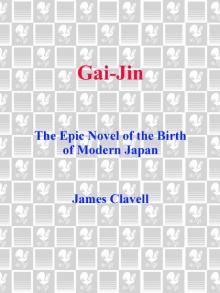 Gai-Jin
Gai-Jin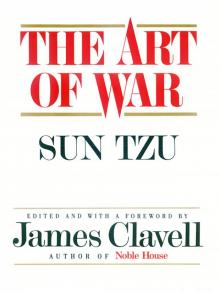 The Art of War
The Art of War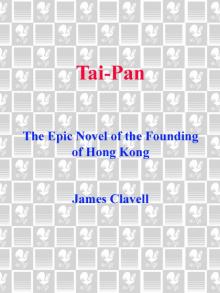 Tai-Pan
Tai-Pan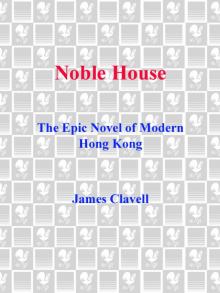 Noble House
Noble House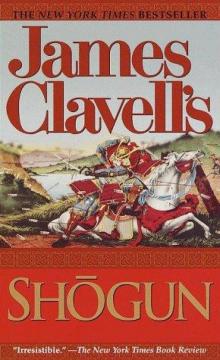 Shōgun
Shōgun Whirlwind
Whirlwind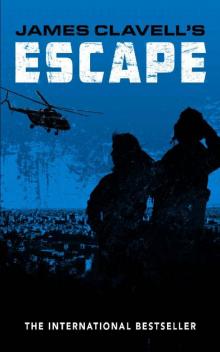 Escape
Escape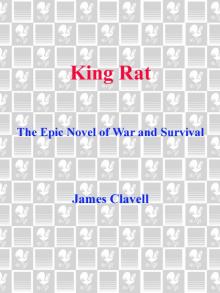 King Rat
King Rat The Children's Story
The Children's Story